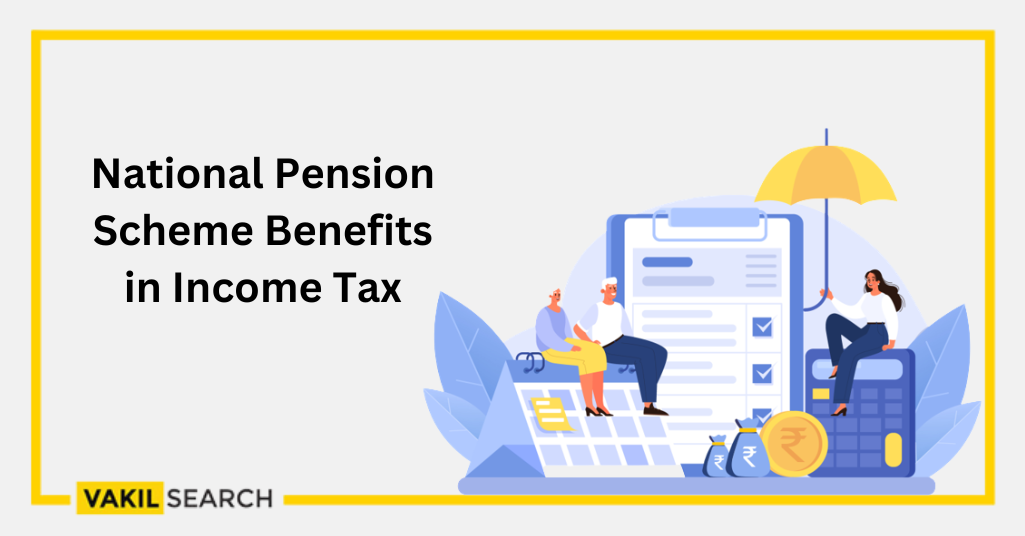The National Pension System offers tax benefits such as deductions under Section 80CCD, exemption on maturity, and lower tax on annuity income, making it an attractive investment option.
The National Pension System (NPS) is a defined contribution pension scheme introduced by the Government of India with the aim of providing citizens with a secure and stable source of income during their retirement years. In addition to offering a reliable source of income in old age, the NPS also provides several tax benefits to subscribers. In this article, we will explore about National Pension Scheme Benefits in Income Tax.
Tax Deduction under Section 80CCD (1)
One of the major tax benefits of the NPS is that contributions made by an individual towards the scheme are eligible for tax deductions under Section 80CCD (1) of the Income Tax Act, 1961. The maximum amount that can be claimed as a deduction under this section is 10% of the basic salary and dearness allowance or 20% of total gross income for self-employed individuals, subject to a maximum limit of ₹ 1.5 lakhs per financial year.
Tax Deduction under Section 80CCD (1B)
In addition to the deductions under Section 80CCD (1), an additional deduction of up to ₹ 50,000 is available under Section 80CCD (1B) for contributions made to the NPS. This additional deduction is over and above the limit of ₹ 1.5 lakhs available under Section 80CCD (1).
Exemption on Maturity
The amount received on maturity of the NPS account is exempt from tax under Section 10 (12A) of the Income Tax Act, 1961. However, only 60% of the maturity amount can be withdrawn as a lump sum, while the remaining 40% must be used to purchase an annuity. The annuity income received thereafter is taxable.
Exemption on Withdrawal
Subscribers of the National Pension System Scheme can also avail of tax benefits on withdrawal. The amount received on closure or partial withdrawal of the NPS account is exempt from tax up to a maximum of 25% of the total contributions made. This exemption is subject to the condition that the subscriber has subscribed to the NPS for a minimum period of 10 years.
Tax Benefits on Annuity
Annuity income received from the NPS is taxed as per the applicable slab rate of the individual. This means that individuals who fall under a lower tax bracket can avail of a lower tax rate on the annuity income received from the NPS.
Use Vakilsearch’s NPS Calculator to find out now figure out how much money you can save after your retirement.
Important Aspects of the National Pension Scheme
- Portability: NPS provides portability across geographical locations and job changes, ensuring that the subscriber’s retirement savings are not affected by changes in employment.
- Investment Flexibility: The NPS offers investment flexibility to the subscribers, allowing them to choose the asset class in which their contributions will be invested. This includes investments in government securities, corporate bonds, and equities.
- Low Costs: NPS is a low-cost pension scheme with minimal account maintenance and fund management charges. This makes it an attractive option for individuals looking for a cost-effective way to save for retirement.
- Online Access: NPS subscribers can access their accounts through the NPS portal, making it easy to keep track of their investments and make changes as needed.
- Retirement Corpus: NPS is a long-term investment option with the ultimate goal of building a retirement corpus. The contributions made by the subscriber, combined with the returns generated on investments, create a retirement fund that can provide a steady income during retirement.
- Partial Withdrawals: NPS allows subscribers to make partial withdrawals for specific purposes such as higher education or buying a house. This provides flexibility and ease of access to funds in an emergency.
- Systematic Withdrawal Option: The NPS offers the option of systematic withdrawal, allowing subscribers to receive a regular income stream from their retirement corpus after reaching 60. This ensures that retiree has a consistent source of income in their golden years.
Click here to get: ITR Filing
Conclusion
The National Pension System is a secure and stable source of income during retirement and offers subscribers several tax benefits. The tax benefits include deductions under Section 80CCD (1) and 80CCD (1B), exemption on maturity and withdrawal, and taxation of annuity income at the applicable slab rate. These National Pension Scheme Benefits in Income Tax make the NPS an attractive option for individuals planning their retirement and saving on taxes.
NPS is a pension scheme that offers a range of benefits to subscribers, including tax benefits, investment flexibility, low costs, online access, and a systematic withdrawal option. With the goal of building a retirement corpus and providing a steady income in old age, NPS is a valuable investment option for individuals looking to secure their financial future.
Read More:

